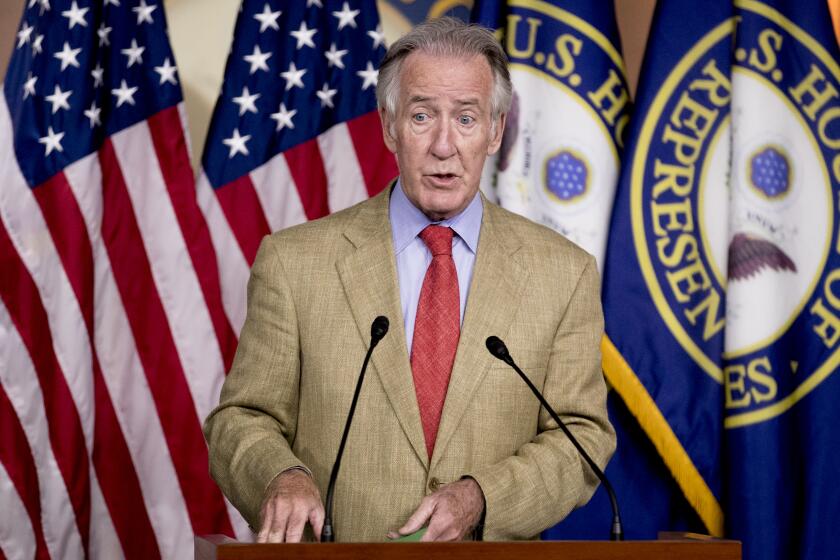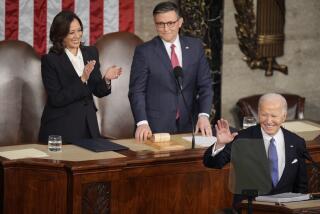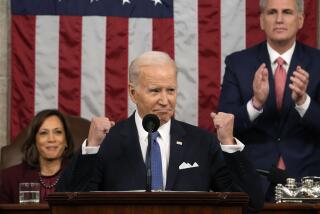Joe Biden has become the anti-Reagan, and his speech to Congress will make that clear
Forty years ago, a newly elected President Ronald Reagan spoke to a joint session of Congress, calling for deep cuts in federal spending. “In this present crisis, government is not the solution to our problem,” Reagan had said at his inauguration. “Government is the problem.”
Twenty-five years ago, then-President Bill Clinton spoke to a similar session of Congress and confessed that he had overestimated the public’s appetite for federal programs. “We have to give the American people [an administration] that lives within its means,” he said. “The era of big government is over.”
This evening, Joe Biden will address Congress for the first time in his presidency and disavow those declarations, making the case for the first time in decades that government spending must be sharply expanded to meet the nation’s needs.
“This is not a plan that tinkers around the edges,” Biden said last month. “It is a once-in-a-generation investment,” including “the largest American jobs [program] since World War II” — and that’s only one-third of his package.
House Democrats propose 12 weeks of paid family leave and expansion of aid to families with children, going beyond what Biden is expected to offer.
The dollar figures are staggering. Biden’s initial emergency plan for relief from the COVID-19 pandemic cost $1.9 trillion and squeaked through Congress without a vote to spare. The second slice, his jobs-and-infrastructure package, would total an estimated $2.3 trillion if Congress passes it as proposed. His newest proposal, a long list of priorities in health, education, child care and family leave, could cost an additional $1.8 trillion. If Congress approves all that spending — a big if — the total will approach $6 trillion.
The boldest, most ambitious goal is Biden’s underlying aim: He’s reversing the Reagan Revolution. Beyond taming the coronavirus and reviving the economy, he hopes to perpetuate, or at least prolong, a sea change in public opinion: He aims to make big government popular again.
More substantively, he hopes to revive what former Clinton aide William A. Galston has called the “liberal democratic bargain,” the idea that governments win legitimacy when they produce not just soaring stock markets, but rising incomes and a growing middle class.
“It’s a basic question,” Biden said last month. “Can democracies still deliver for their people?”
The pandemic and the economic distress it produced have given him a chance to try. Public opinion polls show that near-record numbers of Americans say they want a more activist federal government.
An NBC News Poll this month found that 55% of Americans want the federal government to do more to solve the nation’s problems; only 41% want the government to do less. That’s a reversal from 1995, during the Clinton administration, when 62% said the government was “trying to do too many things.”
The shift in sentiment isn’t solely a response to COVID-19; earlier economic distress played a role too. The NBC poll found similar support for bigger government in 2018, long before anyone heard of the coronavirus.
As public opinion has evolved, so have the political parties. In last year’s presidential campaign, Biden and other Democratic candidates championed a long list of free-spending ideas like a new tax subsidy for families with children, an idea that only four years earlier, Democratic nominee Hillary Clinton rejected as too controversial.
Meanwhile, Republicans’ traditional arguments against spending lost much of their credibility after then-President Donald Trump championed a $2-trillion tax cut that swelled the deficit but did little for middle-class families.
Biden’s hope is that he can take the public’s current mood and turn it into durable sentiment.
“Right now, it’s a crisis response,” Democratic pollster Celinda Lake, who advised Biden’s 2020 campaign, told me. “The challenge for progressives is to make it a long-term response.”
To do that, she said, Biden and his allies need to accomplish two things. One is to make sure their new programs succeed, by delivering palpable benefits to people who need help.
“The rescue plan is very popular because it delivered tangible results; people got checks in the mail,” she noted.
The other is to make sure some of the key voting groups that helped Biden win last year’s election — particularly women and millennials — get the message about what the president is doing.
“There’s substantial support for most of these measures even among Republican women — at least, among women who voted Republican until recently,” she said. “And millennials are more committed to a bigger government role than any generation we’ve seen.”
There’s plenty that can go wrong, of course. Some of those programs could run into problems, as Obama’s healthcare plan did in its early months (it’s wildly popular now). All that federal spending could spur inflation, as deficit hawks have long warned.
But things could also go right. Biden and his aides know that when a big new federal program fills a real, broadly based need — think Social Security (1935), Medicare (1965) or Obamacare (2010) — it can take root and survive.
So the president’s address to Congress on Wednesday, like Reagan’s in 1981 or Clinton’s in 1996, should be worth watching. It just might be one of those speeches we’ll look back on decades from now as marking a hinge point in history.
More to Read
Get the L.A. Times Politics newsletter
Deeply reported insights into legislation, politics and policy from Sacramento, Washington and beyond. In your inbox three times per week.
You may occasionally receive promotional content from the Los Angeles Times.












